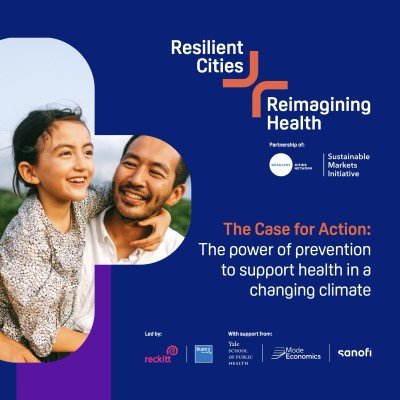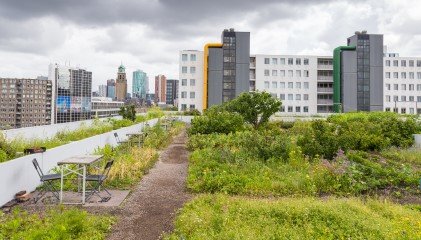Healthy and inclusive spaces to thrive in
Championing healthier, more inclusive communities
Where we live plays a crucial role in our health, especially in a changing climate.
The environments we live in can either support or impact our health. We want to play our part in making cities and communities places where people can stay well and prevent health issues.
Our approach
Our communities commitment and the interventions we deliver will support the creation of inclusive cities and urban environments that not only withstand climate challenges but also promote the wellbeing of their residents.
At Bupa, we know that climate change and urban environments impact every aspect of our health, from the air we breathe, the buildings we live in, the green spaces we have access to, and the way we travel. Where we live and our lifestyle choices have a huge impact on our risk of having health issues.
With cities being on the frontlines of climate change and more people living in these urban environments than ever before, we're focusing our efforts on cities and urban environments to support people's health in places that are that are being hit the hardest.
Our 2027 ambition is to create urban environments in 50 cities that are resilient to climate change and promote overall health and wellbeing in the community.
We're also supporting cities to be more inclusive. With an emphasis on making urban areas more inclusive for young people, we're using our experience from our Paralympics partnerships to support grassroots accessible sports programs in communities.
Our work to support healthy communities will be supported by collaborating with partners to highlight the biggest health challenges in urban areas. Utilising tools like the Healthy Cities Index and others developed by our global collaborations, we can identify and address key health issues in different cities.
Research collaborations enable us to develop targeted interventions, ultimately creating healthier and more resilient urban environments.
We’re working closely with the Sustainable Markets Initiative (SMI) and the Resilient Cities Network on Reimagining Health and supporting resilience in cities. The coalition is building a blueprint for climate-resilient health and co-developing a practical guide to embedding health equity and prevention.
Our partnership with the Norman Foster Foundation has helped lay a strong foundation for advancing health-first urban design. Through the Norman Foster Institute Sustainable Cities Programme programme, we’ve supported scholars with health content and contributed to city projects that embed health criteria - supporting six cities to date, with three more planned in 2026.
Bupa is partnering with the Sustainable Markets Initiative Health Systems Task Force and cities around the world to understand the value of preventative healthcare solutions. Helping people live healthier reduces the burden on health care systems and in turn, their emissions.
Our healthier communitiesambition KPIs
5m people with access to our Healthy Cities preventative health programme by 2027
5m
people
Community projects to foster healthier, more inclusive societies in 50 cities by 2027
50
cities
HealthyCities
Over the past ten years, Bupa’s Healthy Cities initiative has catalysed a global movement, encouraging people to adopt sustainable and healthy lifestyles, while investing in regenerating urban environments for people to thrive.
Our Healthy Cities programme
In 2025, the programme supported over 1 million participants, unlocking over £3m in projects to support urban health and climate resilience across more than 50 cities.
Our nature regeneration efforts focus on deprived urban areas across cities where Bupa has a presence, and peri-urban areas where nature is declining.
Contribution to communitiesaround the world
During 2024 we invested £14.3m in our communities, with over £5.4m of this through the Bupa Foundations. We also enabled a further £436,000 in donations from Bupa employees.

Resilient Cities – The Case for Action
The Case for Action report highlights the power of prevention to support health in a changing climate and reveals how practical, city-led interventions can ease pressure on health systems while delivering major health and climate benefits.













